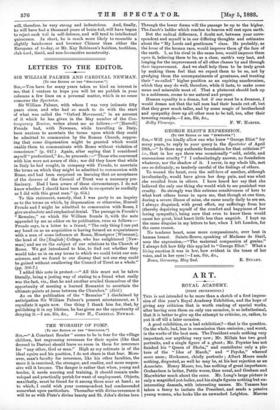GEORGE ELIOT'S EXPRESSION.
go THE EDITOR OF THE "SPECTATOR."' you kindly allow one who knew "George Eliot" for many years, to reply to your query in the Spectator of April 28th,—" Is there any authentic foundation for that criticism 2" i.e., that in her eye there was occasionally "cold, subtle, and unconscious cruelty"? I unhesitatingly answer, no foundation whatever, nor the shadow of it. I never, in my whole life, met one so delicately, so tenderly careful of the feelings of others.
To wound the heart, even the self-love of another, although involuntarily, would have given her deep pain, and was what she recoiled from in others. I have heard her say that she believed the only one thing she would wish to see punished was cruelty. So strongly was this extreme sensitiveness of hers to what hurt others borne in upon me, that though at one time, during a severe illness of mine, she came nearly daily to see me, I always disguised, with great effort, my sufferings from her (thereby depriving myself of the comfort and happiness of her loving sympathy), being sure that even to know them would cause her great, kind heart little less than anguish. I kept up the same disguise in my letters to her, when I left London, for the same reason.
No tenderer heart, none more compassionate, ever beat in
human breast. Sainte-Benve, speaking of Madame de Stael, uses the expression,—" The maternal compassion of genius." I always felt how fitly this applied to "George Eliot." What a living emotion it was in her, how evident in the tones of her voice, and in her eyes !—I am, Sir, Izc., Bonn, Germany, May 2nd. E. STUART.


































 Previous page
Previous page